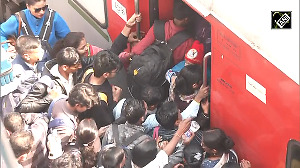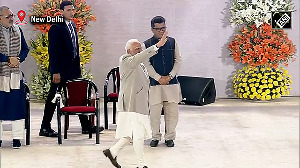Nisid Hajari, the foreign editor of Newsweek magazine, has some understanding of violence in a South Asian context. Speaking to rediff.com, he described the current attacks in Mumbai as being remarkably better organised than earlier ones.
What could the terrorists attempt to gain from such an attack?
"Sow chaos," Hajari responded, pointing out that, like 9/11, the visual impact of this attack was tremendous.
But the ultimate reason for the attacks was disaffection among those in the Muslim population who believe they have been given short shrift in India.
He compared the relative advantages of a strong response with a more conciliatiory effort, and said that prevention before the fact was better than violence after.
"When you use a heavy hammer -- that's when you get into trouble," he said, adding that the terrorists are a tiny minority and efforts should be made to marginalise them within their own community.
Hajari also addressed the possibility of hostages being taken. While there could be negotiations, perceived weakness on the Indian part could result in more violence in future. When India freed three militants in exchange for passengers of an hijacked Indian Airlines aircraft, one of those released, Ahmed Omar Saeed Sheikh, went on to send money to Mohammed Atta, the man leading the team that conducted the 9/11 attacks.
"Giving in to their demands is not the way to go," Hajari said, adding that while there would be negotiations anytime hostages are taken, finally giving in would be hugely detrimental to India's cause.






 © 2025
© 2025